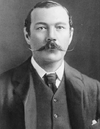Governor-General of Calbion
| Governor-General of Calbion | |

| |
| Seal of the Calbain government | |

| |
| Incumbent | |
| Cadwaladr Bevan-Hall | |
| since XV.1696 | |
| Style | Sir |
| Residence | Galfari Hall |
| Appointer | Prince of the Calbain |
| Term | until dismissal, no term limits |
| Inaugural holder | William Nelson |
| Formation | 1595 |
The Governor-General of Calbion is the head of government of Calbion. He is elected by the Cynulliad Cenedlaethol and appointed by the Prince of the Calbain. Although officially "serving at the pleasure of the Prince of the Calbain", in practice the Governor-General has evolved to be the most important and powerful political figure in Calbion. Current Governor-General is Cadwaladr Bevan-Hall of the Nationalist faction.
History
The ancient Calbain did not have a Governor-General. The Prince of the Calbain ruled as an absolute monarch, although in later centuries heavily influenced by the High Council. Following the Southbatavian expedition to Calbion and the establishment of a formal Calbain state entity under the leadership of the later Prince Jack I, the office of Governor-General was created. For a few years, the Governor-General was the sole ruler of Calbion, until Jack I was invested as Prince of the Calbain. After this however, the position of Governor-General was maintained as a principle advisor to the Prince. William Nelson, second in command of the expedition, served as Governor-General for several years leading up to the Calbain revolt.
After the reconstruction of Calbion, Llywelyn Lewis was appointed Governor-General. Lewis' personal abilities and political prowess ensured that the power of the Governor-General expanded drastically. From 1608 until 1628, Lewis and Prince Jack I governed Calbion together, with the lines between their specific constitutional powers and duties being blurred frequently. After the death of Jack I, and in the later days as a Brettish protectorate, the position of Governor-General became much more powerful, and the Prince of the Calbain more and more became a ceremonial role. During the Brettish period, the Governor-General was the representative of Calbion and leader of the Calbain autonomous government. The fact that the Governor-General now received its legitimacy from the Cynulliad Cenedlaethol greatly strengthened the position. This trend has continued until the present day.
Powers
The Governor-General has the de facto sole executive power, ruling in the name of the Prince of the Calbain. Many executive tasks are delegated to the members of the High Council, who are appointed and dismissed at will by the Governor-General. In addition to being the executive, the Governor-General has legislative power through decrees. As such, he is the shared legislative authority, together with the Cynulliad Cenedlaethol. There is no distinction between the power of decree and the power of legislation, making the legislative power of the Assembly and the Governor-General equal. The Governor-General rules for an undefined time, and may in theory serve until death. When a Governor-General however loses the confidence of the Cynulliad Cenedlaethol, tradition dictates that he should resign and that new general elections are called. A Governor-General may also call new Cynulliad Cenedlaethol elections, but only if this is supported by a majority of its members.
List of Governor-Generals
| Picture | Period | Faction | Governor-General | notes | |
|---|---|---|---|---|---|

|
1597 - 1600 (1 - 4 ÔD) | Independent | William Nelson | Office established. Calbion as an Jingdaoese autonomous province | |
| Calbain government decentralised following losses in the independence war | |||||

|
1608 - 1610 (12 - 14 ÔD) | Realist | James Sherrinford | Calbion became a province of the Brettish Isles. | |

|
1610 - 1623 (14 - 27 ÔD) |
Realist | Llywelyn Lewis | Lewis was appointed at age 20 by the Brettish government | |
| 1623 - 1649 (27 - 53 ÔD) |
Nationalist | Lewis won the first elections for the Cynulliad Cenedlaethol on a nationalist platform and led Calbion to independence in 1627. Lewis won a third term in 1636. | |||
| 1649 - 1651 (53 - 55 ÔD) |
Realist | Calbion became an autonomous province of Jingdao. Lewis attempted to work with the Jingdaoese government to ensure the continuity of the Calbain nation but was forced into exile in 1651. | |||
| 1651 - 1667 (54 - 70 ÔD) |
Nationalist | Following his exile, Lewis and other nationalist leaders set up a government in exile on the Skerry Isles. Lewis died in 1667. | |||

|
1667 - 1685 (70 - 89 ÔD) | Nationalist | Huw Griffin | Following the death of Llywelyn Lewis, Huw Griffin took over as Governor-General in exile. | |

|
1673 - 1685 (76 - 89 ÔD) | Realist | Mackenzie Ó Gallchobhai | Under Arcadian occupation, Calbion gained some autonomy. The collaboration government led by Ó Gallchobhai was however unrecognised by most nationalists. | |

|
1685 - 1688 (89 - 92 ÔD) | Nationalist | Evyn Drakeford | In 1685, Calbion regained its independence. The nationalists regained the government. | |

|
1688 - 1696 (92 - 100 ÔD) | Realist | Richard ab Ioan | His eight year rule saw Calbion expand its frontiers significantly and become once again a nation of international significance. | |

|
1696 - present (100 - present ÔD) | Nationalist | Cadwaladr Bevan-Hall | ||
Timeline
